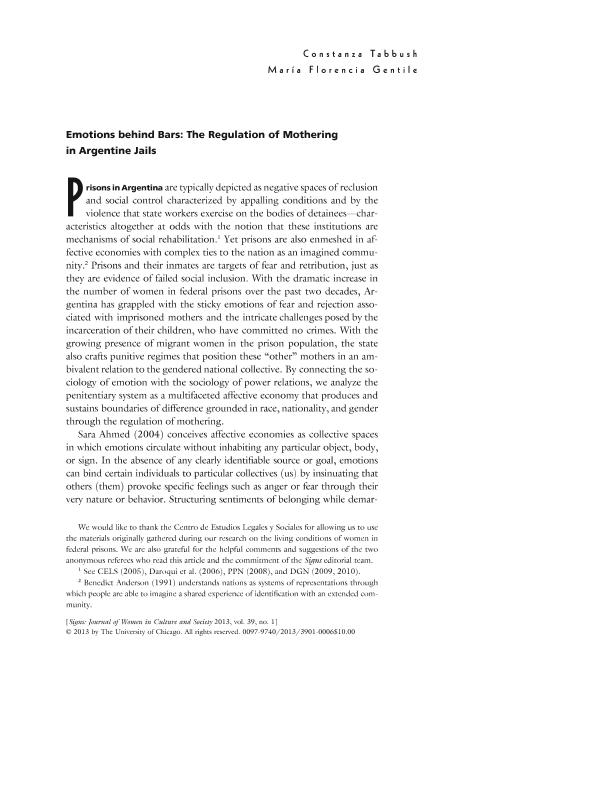Mostrar el registro sencillo del ítem
dc.contributor.author
Tabbush, Constanza

dc.contributor.author
Gentile, María Florencia

dc.date.available
2017-10-03T19:25:47Z
dc.date.issued
2013-09
dc.identifier.citation
Tabbush, Constanza; Gentile, María Florencia; Emotions behind bars: the regulation of mothering a child in Argentine jails; University of Chicago Press; Signs; 39; 1; 9-2013; 131-150
dc.identifier.issn
0097-9740
dc.identifier.uri
http://hdl.handle.net/11336/25809
dc.description.abstract
This article considers how the contemporary Argentine nation is produced through the regulation of mothering in the federal penitentiary system. The analysis is based on legal narratives of mothering and on women’s social exchanges with female guards. To explore the emotional dimensions of social justice, this article understands prisons as objects of public feelings and as affective economies where emotions circulate. It argues that, through the regulation of mothering in institutions of social control, the nation-state disciplines particular modes of emotional life to foster gendered illusions of belonging for young migrant women and girls. Penal legislation splits mothering into two periods: Until children are four years old, women are regarded solely as biological reproducers of the nation, and mothering is allowed in prison yet exclusively defined as a biological exchange between the bodies of mother and child. However, after the child reaches age four, the fear of moral contamination incarnated in these women constructs them as undesirable agents of cultural transmission to the next generation. The effect is the removal of their children from prison. These two models conceive the future generation’s well-being as dependent on women’s bodies until the children are four years old and, after that, on the fantasy of a nuclear, heterosexual family outside prison. The paradoxical position of incarcerated women vis-à-vis the nation is policed by guards who regulate prison’s affective economies, reducing women’s access to income and goods, shaping the technologies of punishment applied to them, and limiting the forms of agency and social transformation available.
dc.format
application/pdf
dc.language.iso
eng
dc.publisher
University of Chicago Press

dc.rights
info:eu-repo/semantics/openAccess
dc.rights.uri
https://creativecommons.org/licenses/by-nc/2.5/ar/
dc.subject
Social Control
dc.subject
Gender
dc.subject
Emotion
dc.subject
Mothering
dc.subject.classification
Demografía

dc.subject.classification
Sociología

dc.subject.classification
CIENCIAS SOCIALES

dc.title
Emotions behind bars: the regulation of mothering a child in Argentine jails
dc.type
info:eu-repo/semantics/article
dc.type
info:ar-repo/semantics/artículo
dc.type
info:eu-repo/semantics/publishedVersion
dc.date.updated
2017-09-28T18:12:15Z
dc.journal.volume
39
dc.journal.number
1
dc.journal.pagination
131-150
dc.journal.pais
Estados Unidos

dc.journal.ciudad
Chicago
dc.description.fil
Fil: Tabbush, Constanza. Universidad de Buenos Aires. Facultad de Filosofía y Letras. Instituto Interdisciplinario de Estudios de Género; Argentina. Consejo Nacional de Investigaciones Científicas y Técnicas; Argentina
dc.description.fil
Fil: Gentile, María Florencia. Universidad Nacional de General Sarmiento; Argentina. Consejo Nacional de Investigaciones Científicas y Técnicas; Argentina
dc.journal.title
Signs

dc.relation.alternativeid
info:eu-repo/semantics/altIdentifier/url/http://www.journals.uchicago.edu/doi/abs/10.1086/670920
Archivos asociados
